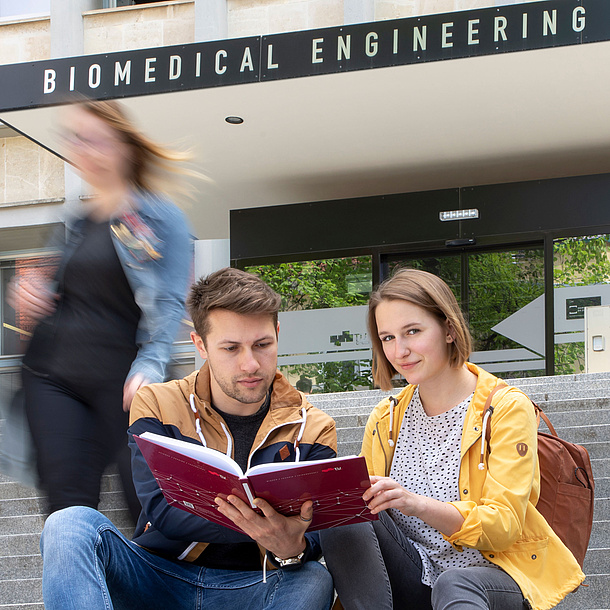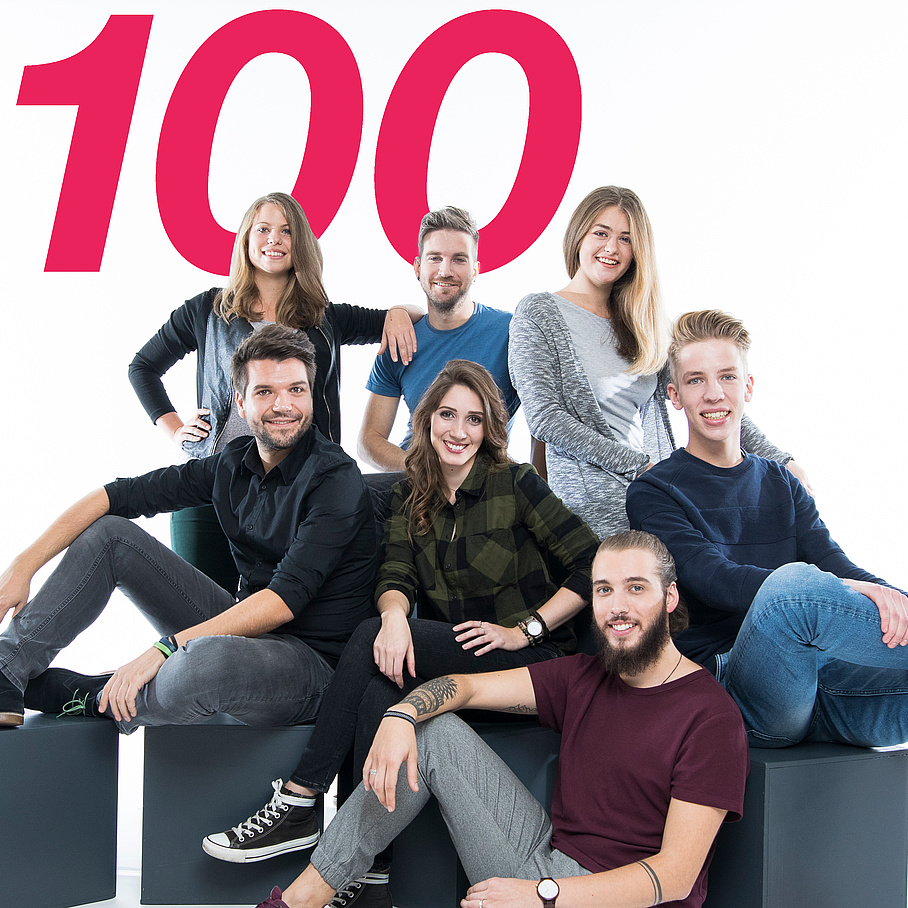The Master's Programme
The master's degree programme Biomedical Engineering
is especially important from both a national and an international perspective. Students in this programme develop technical solutions for health care in the future and work on projects and master theses with practical applications at the cutting edge of research.
In the master's degree programme, you will broaden and deepen the fundamental knowledge you acquired in the bachelor's degree programme and specialise in vital areas of medical technology. Students have access to excellent research infrastructure, including a
- BCI Lab with an arm-robot, EEG measurement and fNIRS measurement devices,
- 3T magnet resonance scanner,
- cellular electrophysiology lab,
- research lab for biomechanics, and a
- lab for nuclear quadrupole spectroscopy.
Student initiatives are actively promoted or instigated. Interdisciplinary teams are created, for example, in the field of biotechnology or labs are opened for student initiatives. As an example, the student team Graz BCI Racing Team works on brain-computer interfaces.
Play video
Focus Areas
You choose one of the five technical catalogues of electives as your major subject (major). As a minor subject (minor), you can choose another technical or the non-technical catalogue of electives:
Biomechanics: You will learn how to analyse phenomena of biomaterials on the nano, micro, or macro level experimentally, theoretically, and numerically.
Biomedical Instrumentation and Sensors: You will gain comprehensive skills that enable you to understand the biophysical and chemical mechanisms of sensors and learn the basics of the hardware required for signal processing. You can use this knowledge to develop measurement, analysis, and diagnostic systems.
Biomedical Imaging and Sensing: You will become familiar with basic principles as well as the devices and methods used for biomedical information acquisition, processing, analysis, and visualisation. Biomedical imaging and sensing is an essential part of the diagnostic and therapeutic interaction and is a prerequisite for providing individualized medical care.
Computational Neuroscience: You will gain insights into the fields of biosignal processing, and primarily learn more about brain signals, machine learning methods, computer science, and neuroscience. For example, you will investigate central nervous system processes using computational methods and develop brain-computer interfaces.
Health Care Engineering: You will learn to design and build new biomedical sensors, systems, and devices and to identify, survey, and evaluate regulatory and safety aspects and risks. In addition, you can deepen your knowledge in the field of computer-aided and experimental electrophysiology.
Business, Law and Management: You will learn more about essential management functions, such as legal and economic aspects of business management and business sociology.
Coming soon: Bioinformatics & Computational Medicine: Students who choose this specialisation have an opportunity to obtain comprehensive technical and biomedical knowledge about biomedical technologies, health informatics, and bioinformatics solutions and technologies such as individualised medications for patients using Big Data technologies.
Collaborations and Networks
Guest lectures given by internationally renowned lecturers from academia and industry provide exciting insights into biomedical engineering in practice. These lectures play an important role in the degree programme.
A good network has been established with scientific institutions such as UMC Utrecht and European BCI groups, promoting lively exchanges among students. Long-term cooperations with companies from the medical technology sector, research institutions for applied science, such as the AIT, and clinics enable students to carry out practical master theses, which have already resulted in patents in individual cases.
In addition, networks related to degree programmes, such as the MRI Club Graz, promote informal exchange among doctoral students from the Medical University of Graz, University of Graz, and TU Graz.
The Austrian Society for Biomedical Engineering (ÖGBMT) organises a sponsorship award for young scientists. Excellent master's theses and dissertations can receive this award.
Admission
The prerequisite for admission is a completed bachelor’s degree in a relevant subject (see curriculum).
Additionally, you need to provide evidence of competence in the English language.
1. Admission Procedure
Admission without admission procedure
The following categories of applicants are eligible for the master’s programme without an admissions procedure:
1. Graduates of the following bachelor’s programmes at TU Graz:
2. Graduates of the following Bachelor’s programmes at other universities:
Graduates of all other degree programmes offered at the TU Graz or, in the case of a NAWI Graz programme, the University of Graz can apply for admission at the Registrar's Office without an admission procedure.
Admission with admission procedure
Graduates of a previous study programme not mentioned above undergo an admission procedure.
Registration for the academic year 2025/26: 15 October to 15 December 2024
You can complete the admission procedure before the end of your bachelor’s studies.
2. Admission
- Admission and deadlines for international students
- Admission and deadlines for Austrian students who are registering to study at TU Graz for the first time
If you have already been admitted to a degree programme at TU Graz, or have studied at TU Graz before, please come to the Registrar's Office in person to complete your admission during the admission period.
Information and Advice
Contact study@tugraz.at
Professional Fields
The career options for graduates of the master's degree programme Biomedical Engineering are highly diverse. These graduates are in demand in industry, service companies, the public sector, as well as in science, research, and teaching. For example, they work
- as device developers,
- as equipment manufacturers,
- in research and development for industry and health care,
- in the development of methods and tools for research, development, and production in the biotech and pharmaceutical industries,
- in basic research, including research in the field of neuroscience,
- in the development and production of drugs,
- with regulatory authorities, or
- as project or department managers in relevant research and development institutions.
Possible professions in the hospital and health care sector include
- risk manager,
- quality manager,
- hospital manager, and
- safety technician.

Since the beginning I was fascinated by the curriculum of Biomedical Engineering as it unites several technical and life sciences disciplines, offers an excellent basis for a multi-faceted ‘system thinking’ and most of all it subsequently provided for a broad spectrum of career options. This very versatile university programme has been groundbreaking to me as scientist, entrepreneur and business executive. It has offered to me the foundation that I still rely on. To this day I am well connected to TU Graz and have fond memories of my time there.


![[Translate to Englisch:] Bildquelle: Müller-Putz](https://www.tugraz.at/fileadmin/user_upload/tugrazInternal/Studium/Studieren_an_der_TU_Graz/Studierendenteams/Wettbewerbs-_und_Fokusteams/BCI_Rascing_Gruppe_by_Mueller_Putz.jpg)

